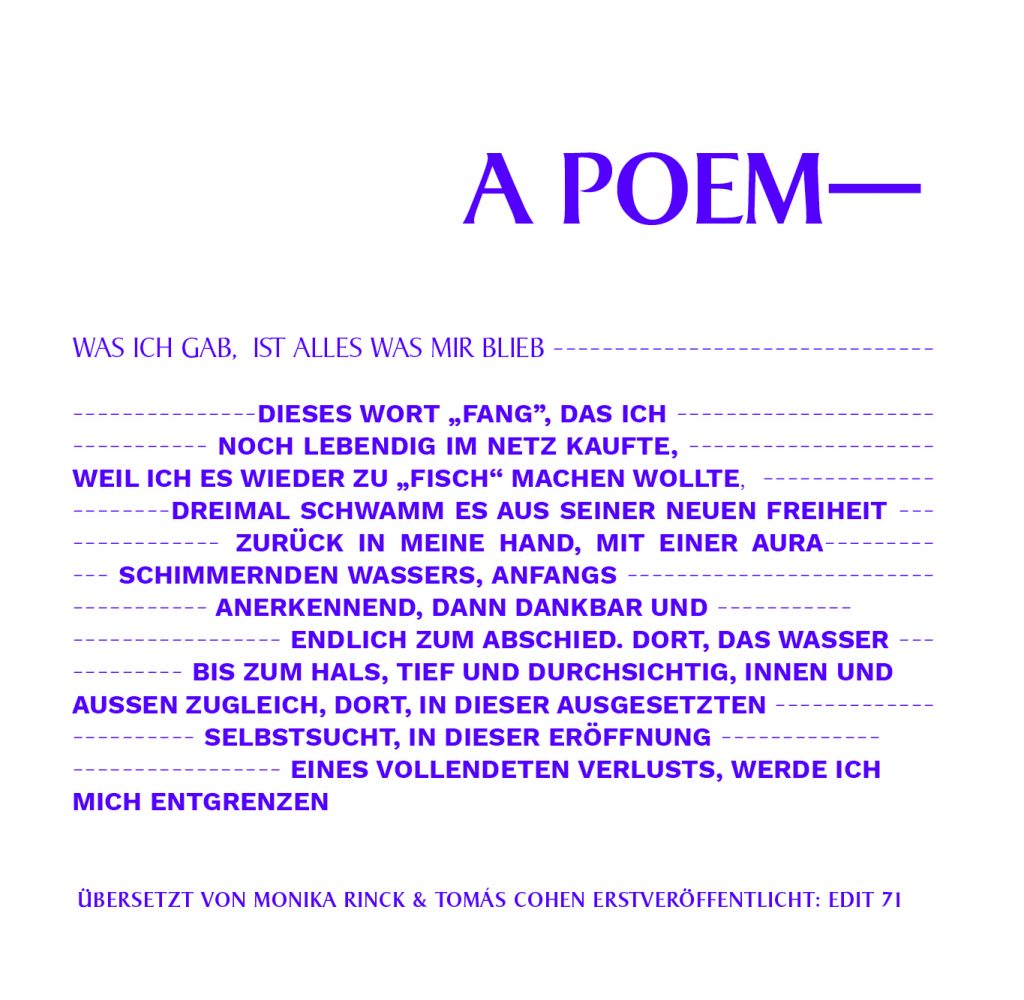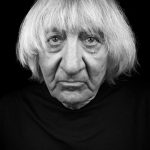INTERVIEW ———A FILM / A POEM / AND A WALK, ein filmisches Portrait — by // Christoph höhmann und cris
tomás // Schriftsteller, Übersetzer aus Chile, Pfeifenraucher — und für mich ein wahrer Schöngeist — der nicht nur durch Worte, sondern auch durch seine Erscheinung Bilder und Gedanken provoziert und uns somit auf eine positive Art & Weise mit „Andersartigkeit“ konfrontiert.
Tomás studierte zunächst Bildende Kunst, Musikwissenschaft und Kunstgeschichte in Santiago de Chile und New York. Nach zwei Jahren in Nepal studiert er zurzeit Buddhismus, Tibetisch und Sanskrit an der Universität Hamburg. Mehrere Bücher und Texte von ihm sind in Chile, Argentinien und Deutschland veröffentlicht worden. Als Mitglied des Autorenkollektivs Found in Translation HAT er die internationale und mehrsprachige Lesereihe Hafenlesung (zuerst Golem und heute im Nachtasyl/Thalia Theater) mitentwickelt und mitgeprägt.
TC — TOMÁS COHEN
Disziplin, Leidensfähigkeit, Liebe, Leidenschaft, Geld — wie verbindest du diese Begriffe, mit deiner Arbeit?
TC — Discipline enough for rekindling passion every day from the everyday. Love regarded as a talent for caring more about others than oneself, willing to expose one’s most vulnerable place, and thus to suffer, in order to be transformed. Money… for the artist, “..that is the question”.
»
Deine Initialzündung in Sachen Kunst und Poesie?
TC — All that is sensual in me – the faith in something non-conceptual, in attaining knowledge from the immediacy of hands – came to me from my maternal grandparents: my grandmother Blanca Rosa was a tailor, my grandfather Hugo was a carpenter, and my sensibility grew up in their fabric-coloured and wood-smelling workshops. I started recognising my personal taste in art and life by drawing and writing comics when I was a kid, then writing and singing lyrics for a punk band when I was teenager; later, falling endlessly in love with classical music and its proposition that strength comes from form— these persons, things, happenings and art-forms initiated and keep nurturing my poetry.
»
Rastlosigkeit und Leidenschaft für die Freiheit sind Aspekte die deine Gedichte prägen — und dich bis jetzt nie lange an einen Ort binden. Chile, New York, ein Kloster in Nepal, Hamburg, Berlin … Ist diese „innere Unruhe“ der Motor deiner Kreativität?
TC — The inner travel is the most important one, and it can certainly happen without moving a finger, but the external, geographical movement sure promotes that inner, perhaps spiritual trip. A culture-shock triggers, by contrast, the culture you already have within you. Indeed, as you say, successively leaving one’s place of familiarity, one’s “comfort zone” has been one of my sustained practices during the last decade… more than traveling, I have been actually living in radically different places of the world, one after the other. I am fond of that mix of Spruch and joke that says “a good Jew has his luggage always ready”— and, by the way, I have never felt more Jewish than now in Germany!
»
Zusammen mit weitern Autoren…(Hugh James, Jonis Hartmann, Nefeli Kavouras, Lubi Barre, Annika Dorau) make up the Hamburger Schriftsteller Kollektiv „Found in Translation“. Wie ist es zu diesem „bunten Haufen“ gekommen?
TC — The New-Zealander Hugh James, besides being a novelist and bassist, is one of the stable bartenders of Aurel, perhaps the most popular bar of Ottensen. That Viertel happened to be my first one in Hamburg, and that’s where I met him. Back then, Hugh and I realised that we shared the condition of being writers writing in a language that was not the dominant one of the country we lived in, sharing thus the difficulties for presenting, translating and publishing our work. That way, we conceived the Found in Translation Autorenkollektiv and the Hafen Lesung, its Lesereihe, as a platform for multilingual literature being written in Hamburg. Later, other wonderful writers with an international background joined our collective: Jonis Hartmann, Lubi Barre and Nefeli Kavouras. Our most recent member, Annika Dorau now designs a booklet (published by Die Brueder, the publishing house collective behind the Hamburg magazine Gentle Rain and organiser of the Indiecon festival) that is released with each of our readings, bearing witness to the variety of languages, cultures and generations of our guest authors. Thanks to the friendly support of Alvaro Pina Otey (also featured in Tendaysaweek) and Martin Siegmann, we started with the Hafen Lesung in Golem. After that miraculous club closed, we were welcomed by Marc Neubert and Thalia Theater, and are now overjoyed to host our reading series at Nachtasyl. Our Autorenkollektiv is happy to keep developing this platform for representation and resistance of coexisting cultural variety through literature in Hamburg, a Hafen city that has been for centuries a place of coincidence of languages and cultures.

»
„Mehrsprachige Literatur lädt uns ein zu einer Kunst des Verdachtes und macht uns durch das Zusammenleben verschiedener Sprachen eine Vielzahl von Perspektiven der Welt bewusst“, ein Zitat von dir. Du siehst also in Sprachbarrieren auch eine Chance und nicht nur ein Handicap?
TC — Exactly. That is precisely what we struggle to represent at the Hafen Lesung. In relation to that, an important concept behind our reading series is negative capability. This old and far-reaching concept – coined originally by the poet John Keats – means basically that through poetry we rehearse, incorporate and cultivate our capacity for withstanding moments in which we do not understand. This happens when we read good poetry, and also during our Hafen Lesungen, when our audience is confronted with a series of languages that they do not speak, with which they are being spoken to. At those moments, instead of feeling simply frustrated by that momentary suffering of not understanding and zooming out, if we practice this negative capability, we tune into the non-verbal dimension of the foreign language we are hearing, while we crave for meaning, we start hallucinating it— beginning to comprehend the existence of a foreign perspective, to acknowledge that a world-view different to ours is possible. If, at those times, if we keep going and take in that moment of not understanding in its potential preciousness, we might eventually open our hearts and minds, creating in us the space where future understanding can happen.
»
Vom Wort zum Bild— vom Klang zum Gedanken— Transformationen und sinnliche Übersetzungen… sind nicht das die Lösung diese Welt besser verstehen zu können?
TC — Certainly. Translation – vom Wort zum Bild— vom Klang zum Gedanken – is the heart-beat that pushes fresh-aired blood into culture— it is an opening of windows, a breathing in.
»
Die Kunst ein Künstler zu sein— tendaysaweek. Wie stark oder starrsinnig muss man sein, wenn man aus seiner Passion einen Beruf macht?
TC — Strength, stubbornness— they are crucial. A poet must discipline her dreams and passions – in a process not unlike translation – into reality, insistently, every day, gaining experience so as to manifest with words something that is beyond communication.
»
Von der Muse geküsst — wie inspirierst du dich?
TC — Classical music, Dream – its clash and mix with reality – , Childhood, the Erotic, the tension between Nature and Culture – and critiquing that separation – are some of my ongoing inspirations.
»
„Lost in Translation“ — gibt es Momente die dich sprachlos machen?
TC — All the time. That moment of doubt, of lack of words, that makes me look for words, is my residence, the place from which I write.
»
Was ist bei dir im Kühlschrank?
TC — These days, almost nothing.
»
Ein guter Gedanke zum Schluss?
TC — Take care.


Quickreport:
1.süß oder salzig?
süßsauer
2. morgens oder abends?
abends that stretch until morgens
3. mehr ist mehr oder weniger ist mehr?
Less is more, as much as I can
4. lieber allein oder am liebsten mit vielen?
lieber allein
5. auto oder fahrrad?
fahrrad (though I still have to fix it!)
6. sekt oder selters?
Always red wine
7. berge oder meer?
both – which means, Chile
8. electro oder pop?
neither. But when with only those two options, specially for dancing: pop!
9. bleistift oder kugelschreiber?
actually Füllfederhalter
10. rom oder hongkong?
first thought Rom… then Hong Kong just because I haven´t been there yet
11. wahrheit oder pflicht?
Truth, as a feeling— that I need to feel again and again

Film by//


Schreibe einen Kommentar